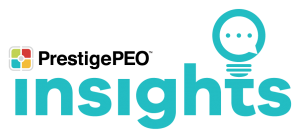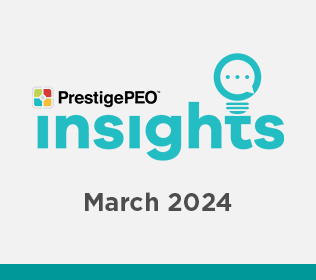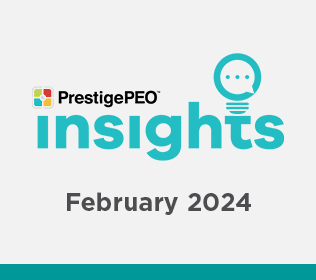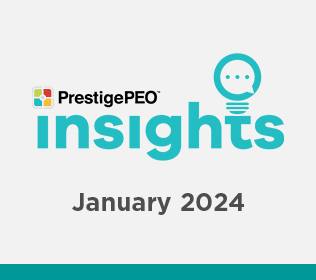
The latest news relevant to you and your business


Thank you for choosing PrestigePEO as your partner for Open Enrollment this year. Below is a letter from our COO, Robyn Rusignuolo.
It is an exciting time at PrestigePEO! We are entering our 2023 Open Enrollment season with some great new products. These enhancements are the result of valuable input from our clients and broker partners and have been designed to simplify and expedite your employee experience, benefits planning, and contribution strategy.
At PrestigePEO, our unwavering focus remains on providing you with unparalleled access to employee benefits packages and related services comparable to those offered by Fortune 500 companies. We understand the significance of offering competitive options that serve your own requirements and the expectations of your employees. Our commitment extends beyond just benefits packages. We are dedicated to delivering exceptional client support and resources to ensure your experience with us is as seamless as possible. Whether you have inquiries, need guidance, or seek assistance with any aspect of benefits management, our personalized service team is here to address your needs.
In addition to our benefits and Open Enrollment Portal enhancements, our Chief Technology Officer, Joe Dodgson, will be sharing some exciting updates to PrestigePRO with you next month.
We thank you for entrusting us with your business. We look forward to a successful Open Enrollment season and continuing to support your business with best-in-class solutions and service. Please feel free to reach out to me directly with questions or feedback at rrusignuolo@prestigepeo.com.
Robyn Rusignuolo
PrestigePEO, COO
We hope that you have found navigating Open Enrollment this year to be efficient and that you were able to create the models that work best for your business! This is a friendly reminder that all contributions are due late September. Making these updates in a timely manner ensures that your employees get ample time to go into their PrestigePRO Employee Benefits Portal to make their own decisions.
If you need help or assistance, the PrestigePEO team is standing by. You can call your dedicated Benefits Specialist, or our benefits team at 833-PEO-BEN1 or oequestions@prestigepeo.com. Don’t forget to visit our Open Enrollment Resource Center, which includes a guided tour of the Renewal Portal and step–by–step instructions.
Don’t forget to sign up for voluntary benefits!
Open Enrollment season is a great time to evaluate our many voluntary benefits. You can sign up for a range of valuable items like life insurance, pet insurance, legal plans, identity and fraud protection, and more. Additionally, we offer reward and discount programs for entertainment and wellness activities. Now is the time to check out everything PrestigePEO has to offer you and your employees. Click the button below to view our voluntary benefits page for more details.
MTA fares are increasing: be prepared with HealthEquity
The MTA recently increased fares on NYC’s subways, buses, and paratransit services. There are also planned increases for the LIRR and Metro-North. With fares rising, it’s a great time to be prepared with a HealthEquity account, our commuter benefits program! Commuter benefits let you use pre-tax dollars to pay for eligible transit expenses. You can activate your benefits at any time. No need to wait for open enrollment. Pause, change, or update whenever you want. No ‘use-it-or-lose-it’, your commuter funds never expire. Learn more about it today!
Introducing Apple Fitness+!
Apple Fitness+ is a new wellness offering included in eligible UnitedHealthcare plans. See if your health plan includes a 1-year Fitness+ subscription. To check eligibility, visit your myuhc.com® account.
What’s more, your subscription can be shared with up to 5 eligible family members! Get ready for a different type of fitness experience with trainers who aim to inspire with a welcoming approach. You have until December 20 to enroll for this special offer! Redeem at the link below.
Please note: You have 12 months of complimentary Apple Fitness + starting from the date you enroll. You must sign up by December 20, 2023, to take advantage of this offer.
New York Pay Transparency Law: Effective September 17, 2023
As of September 17, 2023, employers with four (4) or more employees must disclose the compensation range or exact compensation for both internal and external job postings on internal platforms and third-party platforms, including but not limited to, newspaper advertisements, printed flyers, social media postings, targeted emails to applicant pools, and/or job posting websites. This law applies to jobs that are physically performed in New York and to jobs that are physically performed outside of New York but report to a supervisor, office, or worksite location located in the State of New York.
The compensation range cannot be open-ended and must include either the minimum and maximum annual salary amount or the hourly range of compensation for the advertised position. Additionally, if there are multiple open positions covered under one job posting based on location or seniority of the position, the compensation range must be provided for each specific location or level of seniority.
Examples:
One Location:
- $45,000 to $65,000
- $15/hour to $20/hour
Multiple Locations:
- New York, NY: $150,000 to $200,000
- Buffalo, NY: $120,000 to $170,000
- New York, NY: $40/hour to $60/hour
- Buffalo, NY: $20/hour to $40/hour
Multiple Levels of Seniority:
- Senior Associate: $150,000 to $200,000
- Associate: $120,000 to $170,000
- Executive Assistant: $20/hour to $40/hour
- Assistant: $15/hour to $25/hour
PrestigePEO is here to help.
If you have questions regarding New York’s Pay Transparency law or wage and hour laws, please contact your HR Business Partner.
California Supreme Court’s PAGA Decision: Its impact on future PAGA lawsuits and your arbitration agreements.
In July 2023, the California Supreme Court decided that when employees file claims through the Private Attorneys General Act (PAGA), with both an individual and a non-individual claim, an individual claim compelled to arbitration would not prevent the employee from litigating a non-individual claim in court. Individual claims are for violations that employees have personally suffered, and non-individual claims are for violations that other employees have suffered.
What is PAGA?
PAGA is a California law that allows aggrieved employees to file lawsuits against their employers for California Labor Code violations. Under this law, an employee may recover civil penalties on behalf of themselves, other employees, and/or the State of California.
Before the July 2023 court decision, the U.S. Supreme Court had previously ruled that individual and non-individual claims cannot be simultaneously arbitrated and litigated in court; they must be in the same action. In other words, both must be in arbitration, or both must be litigated in court. If the individual claim goes to arbitration without the non-individual claim, then the non-individual claim would be dismissed for lack of statutory standing, meaning that the plaintiff cannot litigate the case in court.
Last month’s California Supreme Court ruling changed this. If an employee files a PAGA action with individual and non-individual claims, and the individual claim must go to arbitration, this does not mean that the employee loses standing to litigate the non-individual claims in court. However, if the arbitrator finds that the employee did not suffer a wage and hour violation, the employee loses standing and is unable to litigate the non-individual claim in court. The California Supreme Court also suggested staying (suspending a proceeding or trial temporarily or indefinitely) non-individual claims in state court, at the court’s discretion, while awaiting the outcome of the arbitration for the individual claims.
What does this mean for your business?
This decision does not impact your business’s day-to-day; however, if you have been sued under PAGA, you may start to see non-individual PAGA lawsuits, even if the individual claims were in arbitration. The good news is that if, during arbitration, it is determined that the employee did not suffer a California labor code violation, then they would not be considered an aggrieved employee. The employee would not be able to litigate the non-individual claims in court.
What should you do?
Consider implementing an arbitration agreement and stating that PAGA actions are subject to a stay in court and cannot proceed until the individual PAGA claim is arbitrated. If you already have an arbitration agreement, consider adding these terms. To lower the risk of employees successfully taking PAGA claims to court, review your Wage and Hour policies for legal compliance and train your managers on the policies.
PrestigePEO is here to help.
If you have questions about California wage and hour laws, please contact your HR Business Partner.
Oh, Baby! Navigating Maternity Rights at Work
Navigating employee pregnancy and maternity rights at work can be tricky. Typically, an employer is notified of an employee’s pregnancy when the employee makes a reasonable accommodation request related to the pregnancy or makes general inquiries about parental leave policies. Understanding employee maternity rights will not only help you avoid legal issues down the road but will also lead to a happier workforce.
This article provides a general overview of federal law. Please note several states have their own laws on maternity rights, related reasonable accommodations, and parental leave. It is best practice to review those applicable state laws and your company policies with an attorney in the states where you have employees.
Avoid Treating Pregnant Workers Differently from Other Employees
The Pregnancy Discrimination Act (PDA) prohibits discrimination on the basis of pregnancy. This federal law makes it unlawful to discriminate against employees based on pregnancy, potential pregnancy, medical conditions related to pregnancy, lactation, choosing whether to terminate the pregnancy, and use of contraception.
Another law prohibiting discrimination is the American Disabilities Act (ADA). It prohibits discrimination against an applicant or employee based on disability. Although pregnancy is not a disability, impairments may arise from the pregnancy that qualify as a disability. Under the ADA, employers may need to reasonably accommodate their employees for a pregnancy-related disability.
Under PDA and ADA, pregnancy should not play a role in hiring decisions, pay, promotions, job assignments, employee benefits, conditions of employment, or any other aspects of the worker’s employment.
It’s important to note that the PDA and ADA sometimes feel contradictory. However, a good rule of thumb is to allow pregnant employees to voice their need for an accommodation before engaging in the interactive process or making changes to the employee’s job duties. While treating pregnant workers equally may sound obvious, many employers treat employees or job applicants differently because of pregnancy or pregnancy-related conditions. For example, sometimes employers assume a pregnant employee cannot work as much, or lift certain objects, or handle certain tasks due to pregnancy. However, an employee may not require or want any restrictions on their job duties. Employers who force pregnant employees to change their job duties or take other adverse actions against employees due to pregnancy-related matters may be violating the PDA.
If you notice that a job candidate is pregnant during an interview, do not reject the candidate because of this. If a pregnant employee is qualified for a promotion, do not forego promoting the employee due to them being pregnant or needing an accommodation.
Provide Accommodations and Be Aware of Federal and State Laws
Pregnancy and motherhood are life-changing events. Therefore, employees at this phase of their lives will most likely request reasonable accommodations to better navigate these stages. Two federal laws that protect employee reasonable accommodations are the Pregnant Workers Fairness Act (PWFA) and the Providing Urgent Maternal Protections for Nursing Mothers Act (PUMP).
The Pregnant Workers Fairness Act requires employers with 15 or more employees to provide reasonable accommodations for known limitations related to pregnancy, childbirth, or related medical conditions unless doing so causes an undue hardship on the business. Reasonable accommodations may include but are not limited to seating, more frequent restroom breaks, flexible work hours, or even a closer parking space. Therefore, you should train your supervisors on the requirements of the PWFA and ensure that they provide the appropriate reasonable accommodations. You may review our July 2023 Insights article on PWFA here.
The PUMP Act protects employees who are lactating at work. It requires that all FLSA-covered employers provide all employees with (1) a reasonable break time, as needed, and (2) a private space to express milk for up to 1 year after the child’s birth. Teleworkers are also covered under PUMP. You may review our April 2023 Insights article on PUMP here.
There are also state-specific laws on providing reasonable accommodations to pregnant workers. For instance, in New York State, pregnant workers have the right to a reasonable accommodation for any pregnancy-related conditions. Also, in New York State, employers may not discriminate against employees because they are lactating at work, and working mothers have the right to take reasonable break time to express milk at work for up to 3 years after childbirth.
Provide Job Leave When Applicable
It may be necessary for a new parent to take time off from work – whether it’s to spend time with their newborn child or recover from any pregnancy complications. Be aware that your employee may be entitled to a job-protected leave through federal and/or state law.
The Family Medical Leave Act (FMLA) is a federal law that provides qualified employees up to 12 weeks of unpaid, job-protected leave per year. The purpose of this leave is for family or medical reasons. Employees may use this time for the birth of their child, pregnancy complications, and/or for the care of the newborn child.
Aside from FMLA, be aware of state-specific laws that provide paid leave for employees who are undergoing childbirth, adoption, or foster care. Such laws generally provide a percentage of the employee’s salary while they are on leave, but programs may vary from state to state. For example, New York State has the Paid Family Leave law, providing eligible employees up to 12 weeks of job-protected leave to bond with a newborn, adopted, or foster child. Under this law, employees on leave may receive 67% of their average weekly wage, up to a cap of 67% of the current New York State Average Weekly Wage. Also, the State of Connecticut has a program called the Connecticut Paid Leave (CTPL) that offers paid leave to qualifying employees who have met a certain earned-wage threshold. An employee may qualify for CTPL due to birth, adoption, or foster care, and may qualify for 12 weeks of paid leave, and potentially be eligible for an additional two weeks if the employee is experiencing a serious health condition resulting from incapacitation due to pregnancy.
States that have paid family and medical leave laws include:
California |
New Jersey |
Connecticut |
New York |
Delaware |
Oregon |
Maryland |
Rhode Island |
Massachusetts |
Washington |
New Hampshire |
Washington DC |
–
Please note that not all paid family and medical leave laws have the same qualifications, and not all employees are eligible for paid leave under each state’s laws. It is best practice to review those applicable state-paid family and medical leave laws with an attorney in the states in which you have employees to review employee eligibility requirements and/or to confirm if your state has paid family and medical leave laws in place.
PrestigePEO is here to help.
If you have any questions regarding how to best support pregnant individuals or new parents in your workforce, the laws requiring reasonable accommodations, and/or leave in your state, please reach out to your HR Business Partner.
New York City will prohibit height and weight discrimination in the workplace, starting November 22, 2023.
Effective November 22, 2023, it will be unlawful to prohibit employment or take adverse action against an employee based on their actual or perceived height and/or actual or perceived weight in New York City. It will also be prohibited to include height and weight requirements in job advertisements.
Are there circumstances in which employers may make employment decisions based on height and weight?
Yes. This law includes limited exemptions that allow employers to consider an employee’s or job applicant’s height and weight. The following are reasons for the exemptions:
- Federal, state, and local laws, or regulations require employers to consider height or weight for employment decisions.
- The NYC Commission of Human Rights has adopted regulations that permit the consideration of height and weight to be reasonably necessary for the normal operation of the business or that this consideration is needed for an individual to perform the essential requirements of the job.
If neither of the exemptions are applicable, employers will not be liable if they can prove either of the following:
(1) The individual’s height and/or weight prevents them from performing the essential duties of the job, and there is no alternative action the employer can take that will allow the individual to be able to perform the essential duties of their job.
(2) The employer’s decision is reasonably necessary for the normal operations of the business.
What should I do to protect my business?
Although most harassment and discrimination policies include language encompassing any protected categories under the law, you can update your workplace policies, including equal employment opportunity, anti-discrimination, and anti-harassment policies to include height and weight as protected categories. You can also include the prohibition of height and weight discrimination in your workplace training materials.
Jurisdictions That Prohibit Height and Weight Discrimination
Other jurisdictions that also prohibit height and weight discrimination in the workplace include Binghamton, New York; Madison, Wisconsin; Urbana, Illinois; Washington, D.C.; San Francisco, California; Santa Cruz, California; Miami Beach, Florida; and the State of Michigan. Also, there is proposed legislation in New York State to ban height and weight discrimination in the workplace; an update will be provided should this proposed legislation become law.
PrestigePEO is here to help.
If you have questions regarding workplace discrimination, you may contact your HR Business Partner so that we can best help protect your business. If you suspect or know that you will be receiving a discrimination charge, please contact your HR Business Partner immediately.
Reminder: 2022 EEO-1 Component 1 Data Collection is Due Fall 2023
As mentioned in our August 2023 Insights Newsletter, the 2022 EEO-1 Component 1 Data Report is due Fall 2023. The EEOC has since announced that the EEO-1 reporting portal opens October 31, 2023, and the deadline to report will be December 5, 2023. Although the portal is not open yet, PrestigePEO is preparing for this deadline and will be reaching out to clients who are required to file the EEO-1 Report. If you have any questions, please reach out to your HR Business Partner.
The NLRB Has a New Standard for Workplace Policies That May Affect Your Employee Handbook
In August 2023, the National Labor Relations Board (NLRB) decided on a more restrictive standard for workplace rules regulating employee behavior. The NLRB stated that workplace rules and policies must be construed narrowly, to the extent such rules advance a substantial and legitimate business interest of the employer. Such rules and policies cannot be broad or give room for an employee, with no legal background, to possibly interpret the rule in a manner that could infringe on their protected activity under the National Labor Relations Act (NLRA). Employee-protected activities include, but are not limited to, partaking in labor union activity, collective bargaining, discussing compensation with co-workers, and/or discussing working conditions amongst co-workers. Workplace rules should not interfere with, restrain, or coerce employees from exercising their rights. This new standard may affect your current employee handbooks and other workplace policies.
PrestigePEO is here to help.
PrestigePEO is focused on supporting your business, including its handbook needs. If you use PrestigePEO’s federal handbook, we have already reviewed it for compliance with the NLRB’s new standard. If you have any questions regarding your handbook policies or any other workplace policies, please reach out to your HR Business Partner.
September 2023 Federal and State Posting Notice Update
Each month, we will be providing an update on changes to federal and state posters. If you have offices in the states mentioned below, you will be receiving updated posters soon. If your business address changes, promptly contact your HR Business Partner to ensure your business receives the latest posters.
The following are the sections that will be updated in each state poster:
Connecticut |
|
Colorado |
|
Georgia |
|
Virginia |
|
Illinois Employers Will Need to Include Compensation in Job Postings Starting January 1, 2025
Effective January 1, 2025, when publishing a job posting, Illinois employers covered under the Illinois Equal Pay Act must include the position’s pay scale, a general description of the benefits, and other compensation. Also, covered employers must notify all current employees of all job opportunities by the day the job posting is published.
This law does not require employers to create job postings; however, if the employer has not created a job posting, they are required to disclose the pay scale and benefits to the applicant at the applicant’s request. The employer must provide this information before any offer or compensation discussion. In addition, employers must keep records of the pay scale and benefits for each job post for at least five (5) years.
What positions do these requirements apply to? They apply to either:
- Positions that will be physically performed, at least in part, in Illinois; or
- Positions that will be physically performed outside of Illinois, but the employee will be reporting to a supervisor, office, or worksite in Illinois.
Are there penalties for not including the compensation in each job position?
Yes, the Illinois Department of Labor would fine $100 per day, for each day that the violation continues. Each job posting would be considered a separate violation. If a third party assists you with job postings, ensure that they comply with these new requirements because employers will be held liable for non-compliance.
PrestigePEO is here to help.
If you have any questions regarding these job posting requirements, please reach out to your HR Business Partner.

PRESTIGE PERSPECTIVE
The importance of Data in your DEI efforts
Many companies today are aware of the importance of Diversity, Data, and Inclusion (DEI) efforts. DEI helps to improve the business community, increases understanding between colleagues, and brings awareness to marginalized groups. But after you have begun to pursue DEI efforts, you may struggle to quantify the effect your actions have caused, and you may not know where you still need to put additional work. The topic of our latest DEI blog post is on data in DEI, and you can read it at the link below.
Feedback
If you have an idea for a future newsletter, we’d love to hear from you! Additionally, if you’d like more information on our services or programs, we can certainly accommodate that as well. Email marketingteam@prestigepeo.com today!




